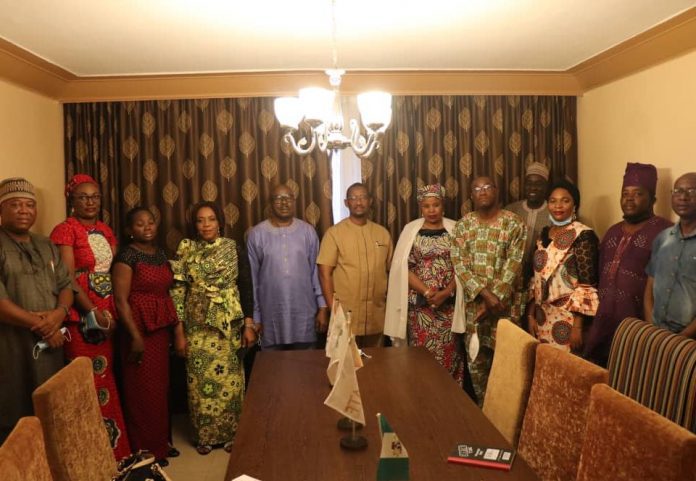The Federal Government has promised that the newly approved Biosecurity Policy and Action Plan 2022-2026 will be implemented 70% of the time.
Chief Sharon Ikeazor, Minister of State for Environment, stated this at the unveiling and public presentation of Nigena’s 5-year National Biosecurity Policy and Action Plan in Abuja.
She stated that carrying out the action plan would ensure Nigeria’s environmental and biological security.
“We are expected as a nation to have significantly improved our national biosecurity system by the end of 2026 through the sincere and efficient implementation of the National Biosecurity Policy and Action Plan,” she said.
Read Also: In Bayelsa, National Rescue Movement Party collapses structure into PDP in 2023.
To that end, we’ve set a 70% success rate as a goal, and I’m confident that we’ll be able to meet it.
“On our part as a ministry through the National Biosafety Management Agency, we will immediately liaise with the national planning team to develop an evaluation template and as well put in motion a facilitation mechanism for the implementation of the policy and its action plans.”
Ikeazor explained that in a bid to secure the health of Nigerians and their immediate environments from biological threats, and sustain socio-economic development, the government conceived the framework for the policy.
She said this was through a legal mandate to ensure the prevention, detection and rapid response to bio-threats, adding that in 2019 the President assented to the bill amending the National Biosafety Management Agency Act (2015).
She said the amendment include putting measures in place to ensure biosecurity in Nigeria, mandating the NBMA to coordinate issues of biosecurity in Nigeria.
“Biosecurity is a strategic and integrated approach that encompasses the policy and regulatory frameworks (including instruments and activities) that analyse and manage risks in the sectors of food safety, animal life and health, plant life and health, including associated environmental risk,” Ikeazor stated.
Read Also: NDLEA intercepts 40,250kg codeine worth N2bn at Lagos port
She added, “It focuses not only on preventing the loss, theft, misuse, diversion, or intentional release of pathogens, toxins, and other related assets against humans, animals, plants, and the environment, but also include putting measures in place to mitigate naturally occurring and emerging infectious diseases.”
In a Goodwill message, the Acting High Commissioner of Canada in Nigeria, Kevin Toker said his government has invested about $8 million to strengthen Nigena’s capacity to prevent, detect and respond to biological threats.
This was carried out through the construction, operation and maintenance of biocontainment laboratones in Lagos and the National Veterinary Research Institute Vom, Plateau State.
He was optimistic that the Canadian-supported laboratones have played a vital role in supporting Nigena’s COVID 19 response throughout the pandemic, especially by enhancing testing capacity.
Toker said that Canada’s continued commitment to strengthen biosecunty and health secunty in Africa was reflected in its ‘Signature initiative to Mitigate Biological Threats in Africa, which is currently implemented by the G7-led Global Partnership Against the Spread of Weapons and Materials of Mass Destruction.
According to him, “The aim of the initiative, which is being delivered in close collaboration with the Africa Centre for Disease Control and Prevention and other African partners including the Nigerian Centre for Disease Control (NCDC) is to reduce bio-threats by aligning the activities of the Global Partnership and African countries in order to achieve shared objectives.”
Read Also: UN court orders Uganda to pay Congo $325m war damages
He was confident that Nigena’s National Biosecurity Policy and Acton Plan would support the evolution and impact of the Signature initiative as well as encourage Nigerian stakeholders to play an active part in brainstorming on biosafety and biosecuriity; national governance structures, surveillance and epidemic inteligence, and non-proliferation.
Toker stated that Canada is proud of its longstanding partnership with Nigena to strengthen national and regional biosecurity capabilites, saying that both countries’ partnership that dates back to over a decade, was strengthened by the ongoing COVID-19 pandemic.
Earlier in his welcome address, the director-general, National Biosafety Management Agency (NBMA), Dr. Rufus Ebegba, said the NBP & AP was developed to improve the issues of biosecurity specifically to put measures in place to ensure that biological agents are contained and prevented from being used to cause harm to the environment and human health.
He pointed out that the new document is the first in Africa to cover all the four thematic areas of biosafety and biosecurity, national governance structures, surveillance and epidemic intelligence and non-proliferation, adding that it will serve as a guideline for other countries to model their framework in biosecurity.
In his remarks, the World Health Organisation (WHO), emergency preparedness and response cluster coordinator, Rex Mpazanje, commended the Nigerian government through the environment minister for being one of the pioneering countries in implementing an integrated OneHealth approach to biosecurity through the establishment of the National Biosafety Management Agency, the formulation of the policy and plan through a multi-stakeholder engagement process and clearly articulated the responsibilities of all relevant sectoral ministries, departments and agencies of government.
Read Also: Agribusiness Firm Warns Of Illegal Account Freezing By Commercial Bank With N300m BOI Facility
“WHO feels privileged to have supported in the development of these important documents. We consider the policy and associated plan as being very important to Nigeria towards the protection of human, animal and plant life and health in an integrated manner. We look forward to continuing to support the NBMA to facilitate its implementation especially knowing that achieving such will require strong multi-sectoral accountability mechanisms,” he added.
Join Television Nigerian Whatsapp Now
Join Television Nigerian Facebook Now
Join Television Nigerian Twitter Now
Join Television Nigerian YouTUbe Now






















